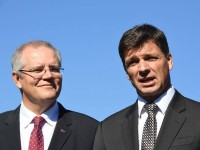Severe weather exposes the problems of privatised power
Friday 25 Jan 2019It’s an election year and the Morrison Government is keen to be seen delivering action on electricity prices. Energy Minister Angus Taylor started the year proclaiming the Federal Government was taking decisive action to reduce power prices and spruiking reductions of up to 15 per cent for customers on standing offers.
There’s no ambiguity about who is responsible for these prices either. "Retailers have been taking advantage of these customers’ loyalty by massively increasing their electricity prices," Mr Taylor said.
Electricity retailers have become public enemy number one for the Morrison Government, who spent a significant amount of time last year threatening to take a “big stick” to retailers in the form of penalties such as forced divestiture.
It doesn’t take an economist to note the irony of the situation: the supposed benefits of profit-driven private enterprises creating competition and efficiency is the foundation on which the case for privatisation has been made for decades.
The fact the Federal Government has been talking about government intervention and forced divestiture is about as far away from free market economics as you can get. It’s enough to raise suspicions about whether privatisation actually delivers any of the benefits it touts.
Unfortunately for the eastern states, the benefits of the ‘big stick’ approach are looking dubious as well.
Grattan Institute Energy Program Director Tony Wood pointed out to The Australian that around 8 per cent of consumers are on standing offers. It’s not exactly relief for the masses.
“The Commonwealth hasn’t actually done anything. What they have done is made lots of noises, lots of threats, lots of shouting, that sort of stuff, and the retailers have responded in part to that.”
Not exactly a ringing endorsement from one of the country’s leading energy experts.
A new year also brings the full force of summer weather conditions, pushing the electricity system to extremes.
For Victoria and South Australia, two states with electricity systems that were 100 per cent privatised, it’s been a particularly challenging start to the season.
The South Australian Government were forced to switch on temporary diesel power generators for the first time this week as the state deals with record-breaking heat conditions. The generators were installed last summer by the Weatherill Government to prevent load shedding blackouts that had previously affected the state in 2017.
This order was made because of a supply shortfall in Victoria put both states under threat. But the emergency supply wasn’t enough.
Today, around 60,000 Victorians lost power in the middle of a heatwave for hours as power companies began rolling blackouts to reduce the load on Victoria’s electricity network.
These extreme weather conditions are becoming more and more frequent across Australia. Power systems will be put under extreme pressure, while infrastructure such as poles and wires remains vulnerable to storm conditions.
Here in Western Australia, the maintenance crews at Western Power and Horizon Power have been well and truly put to the test this week. Across the state, we’ve experienced scorching heat in the high forties, sudden severe storm activity in the south, and cyclone conditions threatening high winds and destruction in the north.
Up to 25,000 homes were affected by storms in the South West and Great Southern, but the majority of those were restored within a few hours thanks to the work of those maintenance crews. Events like these underline why it’s so important to have well-funded and properly staffed crews managing our system around the state.
As WA looks to get through another challenging summer, at least we can be thankful that on this side of the country, we’re not facing the energy crises our eastern friends are becoming all too familiar with. As more and more people realise the problems of privatisation, that could mean a bigger problem for the Morrison Government may be around the corner.

